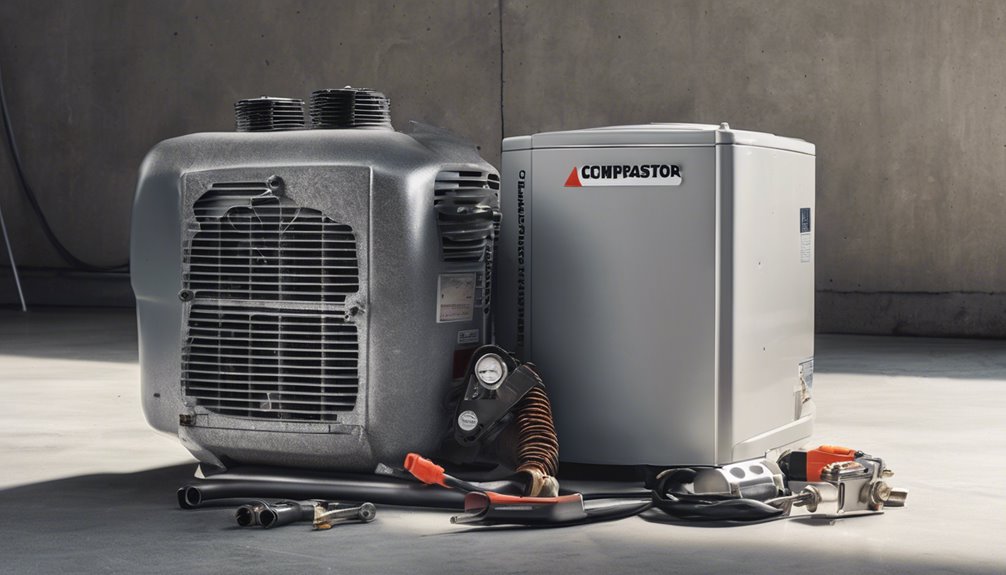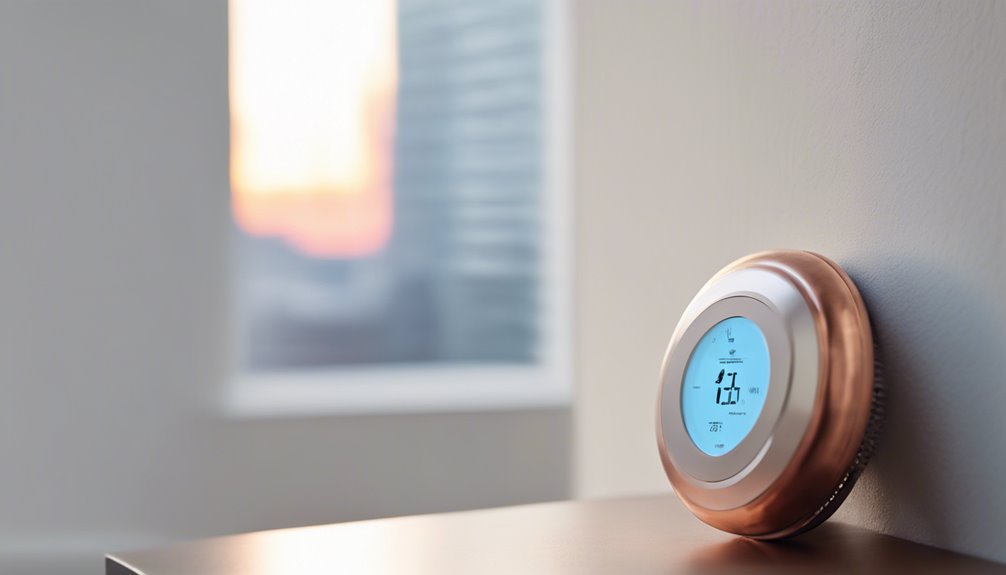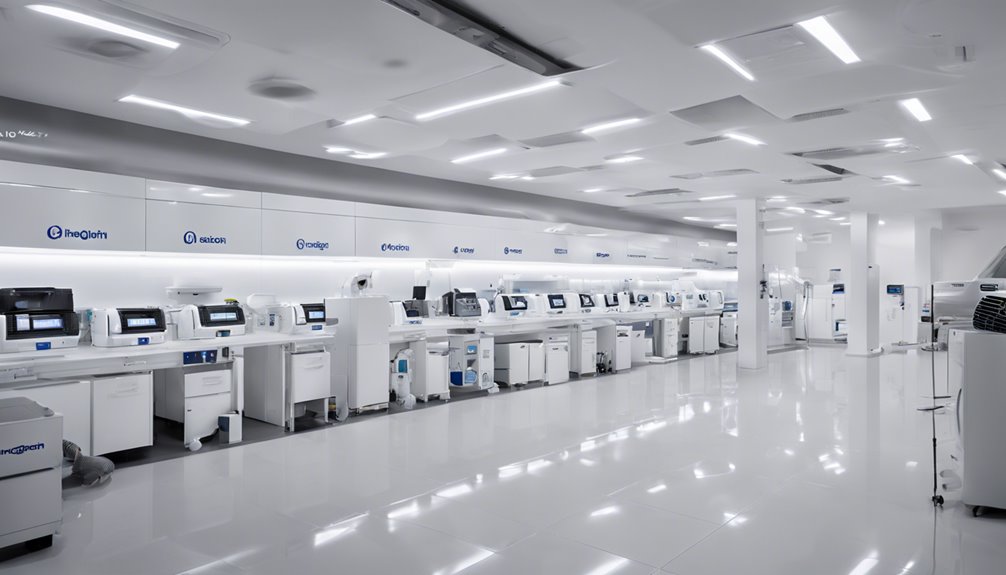When your AC compressor breaks down, you're faced with costly repairs or even complete system failure. But identifying the issue promptly can save you time and money. Look out for unusual noises, reduced airflow, and refrigerant leaks, which signal compressor trouble. Weighing repair versus replacement options is crucial, and considering factors like age, condition, and budget can help you decide. By understanding your choices and taking preventive measures, you can avoid future breakdowns and keep your cool. Explore your options further to find the best solution for your AC compressor needs.
Key Takeaways
- Unusual compressor noises, vibrations, or decreased airflow signal potential issues requiring prompt attention to prevent costly repairs or system failure.
- Repair, replacement, or hybrid options are available, with the choice depending on the compressor's age, condition, budget, and timeline.
- Regular maintenance prevents 75% of air conditioning breakdowns, and hiring a licensed technician ensures efficient diagnosis and repair.
- The type of compressor affects the final repair bill, with labor costs varying depending on the technician's expertise, location, and complexity of the job.
- Proper compressor selection, sizing, and installation are crucial for unit performance, lifespan, and warranty validity.
Identifying the Problem: Common Compressor Issues
When your air conditioning unit starts blowing warm air, you know something's amiss with the AC compressor.
You might notice unusual compressor noise, like clunking, grinding, or hissing sounds, indicating worn or damaged internal components. Another sign of trouble is compressor vibration, which can be felt when you put your hand on the unit.
If the compressor's vibrating excessively, it may be a sign of a loose or imbalanced part. You might also notice a decrease in airflow, a sudden increase in energy bills, or a refrigerant leak.
Repair vs. Replacement: Weighing Your Options
Now that you've identified the problem, it's time to consider your next move. You need to weigh the costs and benefits of repairing versus replacing your AC compressor. This decision depends on several factors, including cost considerations and timeline importance.
| Option | Cost | Timeline |
|---|---|---|
| Repair | Lower upfront cost | Faster turnaround time |
| Replacement | Higher upfront cost | Longer wait for installation |
| Hybrid (repair and upgrade) | Medium upfront cost | Moderate turnaround time |
Consider your budget, how quickly you need the AC up and running, and the long-term benefits of each option. If your compressor is old or has frequent issues, replacement might be the better choice. However, if the problem is minor, a repair might be the way to go.
DIY Diagnosis: Warning Signs of Compressor Failure
Your AC compressor is making strange noises or not cooling your home like it used to – it's time to investigate.
Don't ignore these warning signs, as they can lead to costly repairs or even complete compressor failure.
- Increased compressor noise: If your compressor is making unusual sounds, such as rattling, clunking, or hissing, it may indicate worn or loose parts.
- Decreased cooling capacity: If your AC isn't cooling your home like it used to, it could be a sign of a failing compressor.
- Leaks or water damage: Refrigerant leaks or water damage around the compressor can indicate a serious problem.
- Tripped circuit breakers: If your circuit breaker keeps tripping, it may be a sign of compressor overload or electrical issues.
Hiring a Pro: Qualities to Look for in an AC Technician
If you've identified warning signs of compressor failure, it's time to bring in a professional to diagnose and repair or replace your AC compressor.
When hiring a pro, make sure they've a valid Pro License, which ensures they meet state and local regulations. A licensed technician has the necessary training and expertise to handle complex repairs.
Also, look for Tech Experience in AC compressor repair and replacement. A technician with extensive experience will be able to diagnose the issue quickly and efficiently. Don't be afraid to ask about their experience and certifications.
Compressor Repair Costs: What to Expect
When you're dealing with a broken AC compressor, you're probably wondering what to expect when it comes to repair costs.
The type of compressor you have will play a big role in the final bill, as some are more expensive to fix than others.
Additionally, you'll need to factor in labor costs, which can vary depending on the technician and the complexity of the job, as well as the cost of any necessary parts replacements.
Compressor Type Matters
The type of compressor you have significantly impacts the cost of repair, so it's essential to understand the differences between them.
Compressor history and evolution have led to various types, each with its unique characteristics.
- Reciprocating compressors: These are the oldest type, known for their simplicity and reliability. They're often less expensive to repair.
- Rotary compressors: Introduced in the 1920s, they're more efficient and quieter than reciprocating compressors. Repair costs are moderate.
- Scroll compressors: Developed in the 1980s, they're more energy-efficient and have fewer moving parts. They're more expensive to repair.
- Inverter compressors: The latest innovation, they offer high efficiency and precise temperature control. They're the most expensive to repair.
Understanding your compressor type will help you estimate repair costs accurately.
Labor Costs Vary
You've got a better understanding of your compressor type, which is a significant factor in repair costs.
Now, let's talk about labor costs, which can vary significantly depending on your location and the technician's expertise.
Regional rates play a big role in determining labor costs, with urban areas typically having higher rates than rural areas.
Hourly wages also vary, with experienced technicians charging more than novices.
On average, you can expect to pay between $75 and $150 per hour for a professional technician.
Keep in mind that these rates can add up quickly, especially if the repair requires multiple visits or complex diagnostics.
Parts Replacement Needed
Replacing faulty parts is often the most significant expense in AC compressor repair.
As you consider the cost of fixing your AC, you'll need to factor in the replacement of worn-out components.
Here are some common parts that may need replacement:
- Worn bearings: Over time, compressor bearings can wear down, causing the entire system to malfunction.
- Compressor valves: Faulty valves can lead to refrigerant leaks and decreased cooling performance.
- Capacitors: A faulty capacitor can prevent the compressor from running efficiently, leading to increased energy bills.
- Compressor motor: If your compressor is old or has been damaged, the motor itself may need to be replaced, especially if the compressor age is a factor.
Keep in mind that the cost of these replacements will vary depending on your AC's make, model, and age.
Factors Affecting Compressor Replacement Cost
When you're considering AC compressor replacement, you'll find that the cost varies depending on several key factors.
The type of compressor you need, for instance, can significantly impact the overall price.
Additionally, labor and materials costs will also influence the final bill, so it's essential to understand how these factors interact.
Type of Compressor
The type of compressor you have plays a significant role in determining the cost of replacement.
Knowing the history and evolution of compressors can help you understand why certain types are more expensive to replace than others. For instance, older compressors may require more labor-intensive repairs or harder-to-find parts, increasing the cost.
On the other hand, newer compressors with advanced technology may be more energy-efficient but also more expensive to replace.
- Reciprocating Compressors: These are the most common type and are often less expensive to replace.
- Rotary Compressors: These are more energy-efficient and quieter than reciprocating compressors, but may be more expensive to replace.
- Scroll Compressors: These are known for their high efficiency and low noise levels, but can be more costly to replace.
- Inverter Compressors: These are the most advanced and energy-efficient, but also the most expensive to replace.
Labor and Materials
Your wallet takes a direct hit when you factor in labor and materials, which can significantly drive up the cost of AC compressor replacement.
The quality of materials used can greatly impact the overall cost. High-quality materials, such as OEM parts, can be more expensive, but they often come with a longer warranty and better performance.
On the other hand, lower-quality materials may be cheaper, but they can lead to premature failure and void your warranty. It's essential to consider the warranty impact when choosing materials, as a longer warranty can provide peace of mind and protect your investment.
Additionally, labor costs vary depending on the technician's expertise and location, so it's crucial to choose a reputable and experienced professional to ensure a proper installation.
Choosing the Right Compressor for Your System
Selecting the correct compressor for your AC system is crucial, as it directly impacts the unit's performance, energy efficiency, and overall lifespan.
You'll want to consider several factors when choosing a compressor to ensure it meets your system's specific needs.
- Compressor Sizing: Ensure the compressor is properly sized for your system to avoid inefficiencies and premature wear.
- Type of Compressor: Decide between a reciprocating, scroll, or rotary compressor based on your system's requirements.
- SEER Rating: Choose a compressor with a high SEER rating for improved energy efficiency.
- Compatibility: Verify the compressor is compatible with your system's existing components and refrigerant type.
Preventing Future Breakdowns: Maintenance Tips
Nearly 75% of air conditioning breakdowns can be attributed to neglect or inadequate maintenance. To avoid being part of this statistic, you need to take preventive measures to ensure your AC compressor runs smoothly. Regular servicing is key to preventing future breakdowns. By staying on top of maintenance, you can identify and fix minor issues before they become major problems.
| Task | Frequency | Why It Matters |
|---|---|---|
| Check and replace air filters | Monthly | Improves airflow and reduces strain on compressor |
| Inspect and clean condenser coils | Quarterly | Enhances heat transfer and reduces energy bills |
| Schedule professional maintenance | Annually | Identifies potential issues before they cause breakdowns |
Emergency AC Repair: What to Do in the Meantime
When the AC compressor breaks down, every minute counts.
You need to act fast to stay cool and comfortable until a professional can fix or replace it.
To survive the heatwave, consider these temporary cooling alternatives:
- Portable fans: Circulate air to make your space feel cooler.
- Evaporative coolers: Use them in dry climates to lower temperatures.
- Misting systems: Spray a fine mist to cool you down quickly.
- Shade: Stay out of direct sunlight to reduce heat gain.
Frequently Asked Questions
Can I Repair a Compressor With a Refrigerant Leak Myself?
If you're handy, you can try to fix a refrigerant leak yourself, but be cautious. You'll need to master leak detection methods and proper refrigerant handling to avoid further damage or safety risks, so consider your comfort level before diving in.
Will a New Compressor Improve My Ac's Energy Efficiency?
Like a phoenix rising from the ashes, you're seeking a fresh start for your AC's performance. Installing a new compressor can indeed boost energy efficiency, optimizing your system for significant energy savings, which will leave you feeling cooler and more cost-effective.
Can I Replace a Compressor With a Different Brand?
When replacing a compressor, you'll need to ensure the new one is compatible with your system. While it's possible to replace with a different brand, brand interchangeability can be tricky, so it's crucial to check compatibility before making the swap.
How Long Does a Compressor Repair Typically Take?
You've wondered how long you'll be sweating it out while your compressor gets fixed. The truth is, repair duration varies, but after a thorough compressor diagnosis, most repairs take anywhere from a few hours to a few days, depending on the issue's complexity.
Do I Need to Replace the Whole AC Unit if the Compressor Fails?
If a crucial component fails, you're often left wondering if it's worth fixing or replacing the entire system. In this case, you don't necessarily need to replace the whole unit if the compressor fails, as cost factors and system design come into play.
Conclusion
You've got the AC compressor repair and replacement process down pat! Now, it's time to take a deep breath and tackle the task at hand. Remember, an ounce of prevention is worth a pound of cure – staying on top of maintenance will save you from sweating bullets when the mercury rises. With the right know-how and a reliable technician, you'll be back to cool and comfortable in no time!



